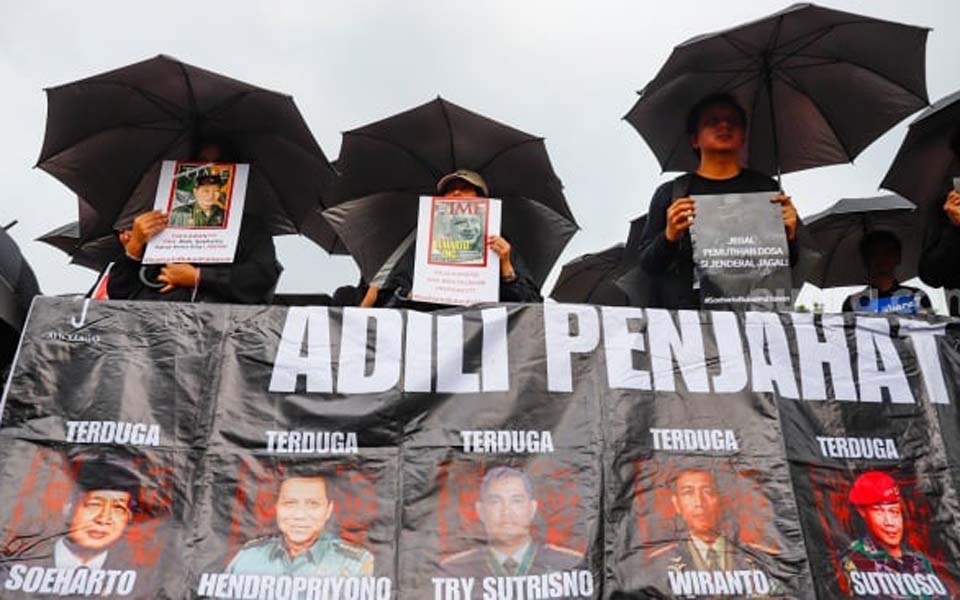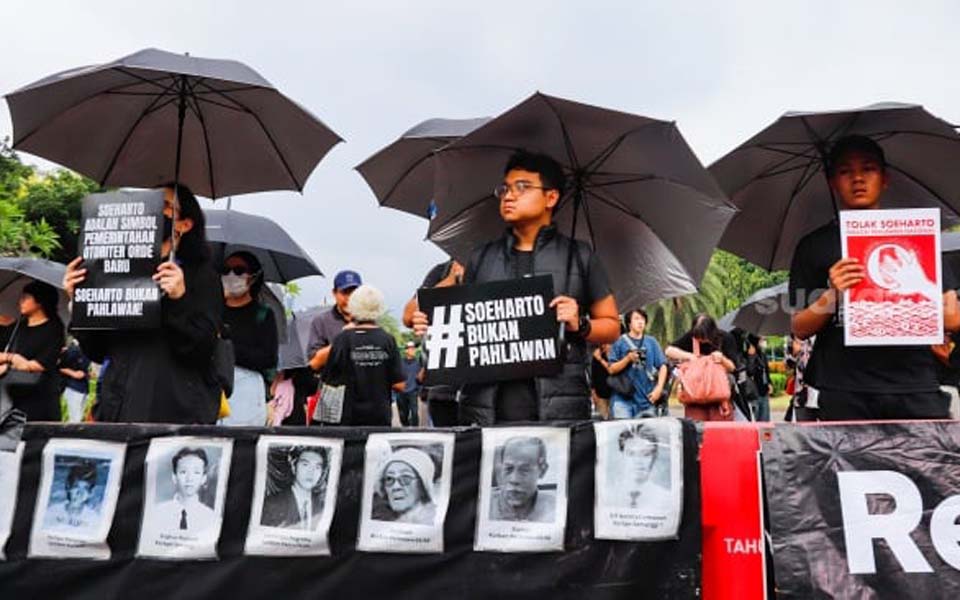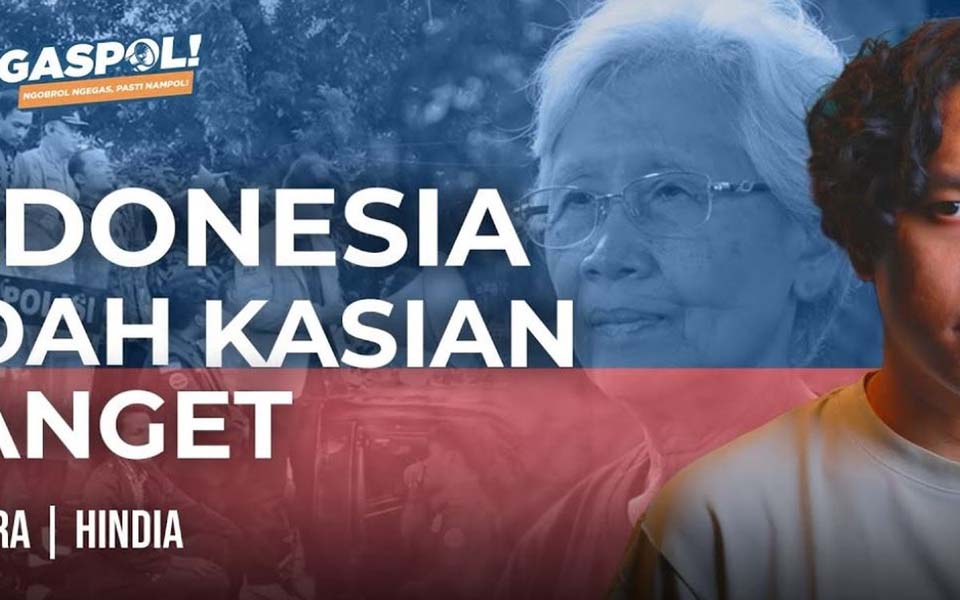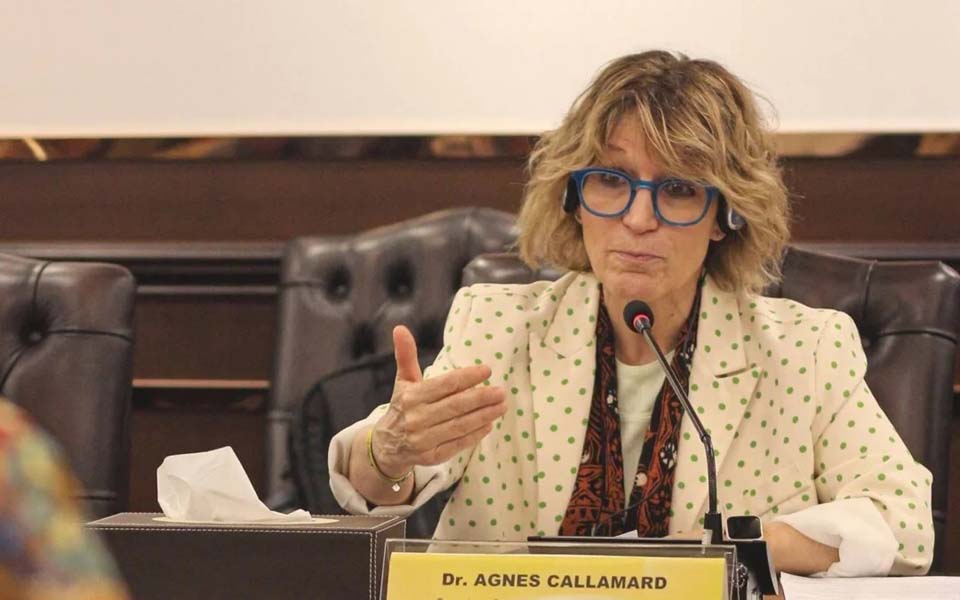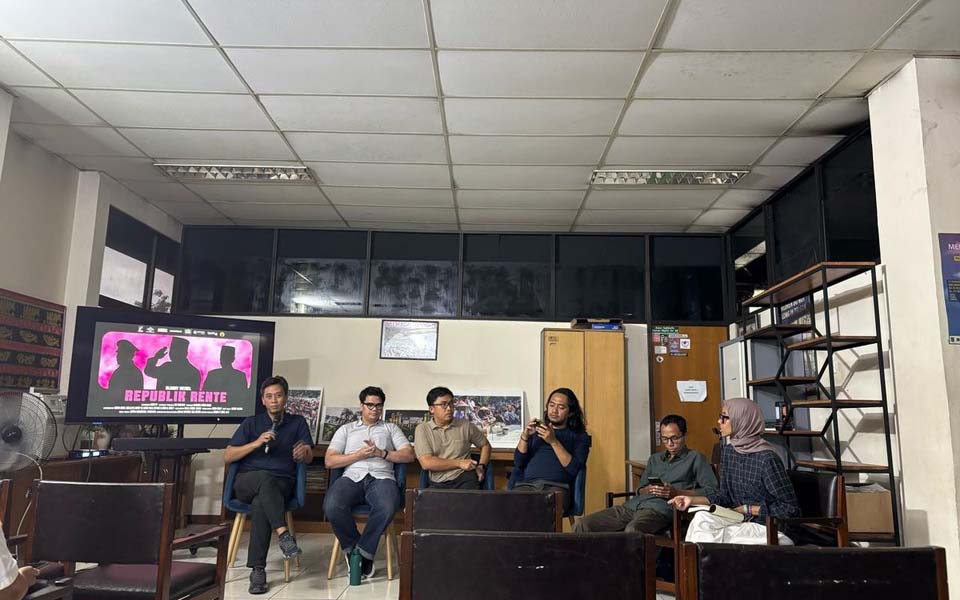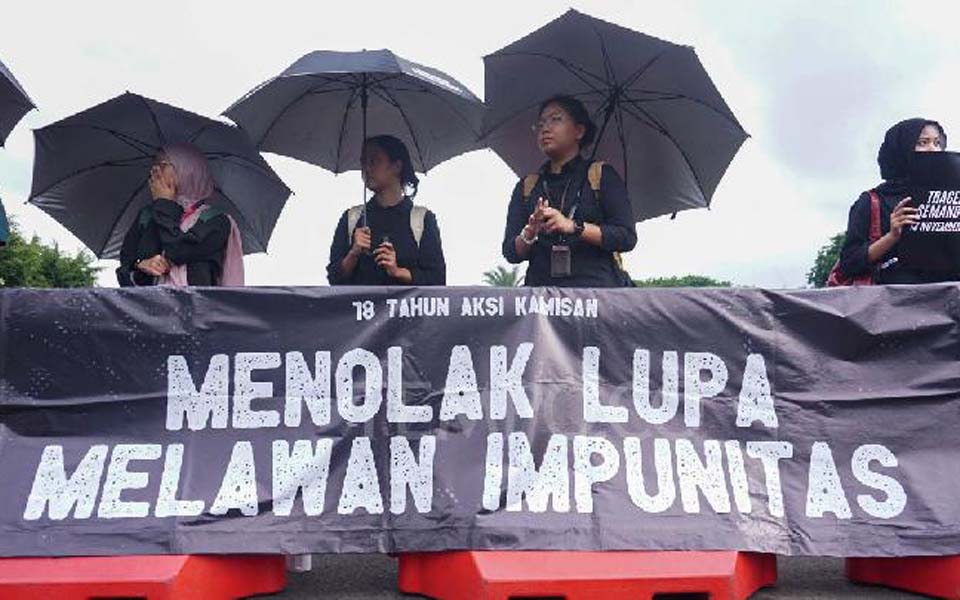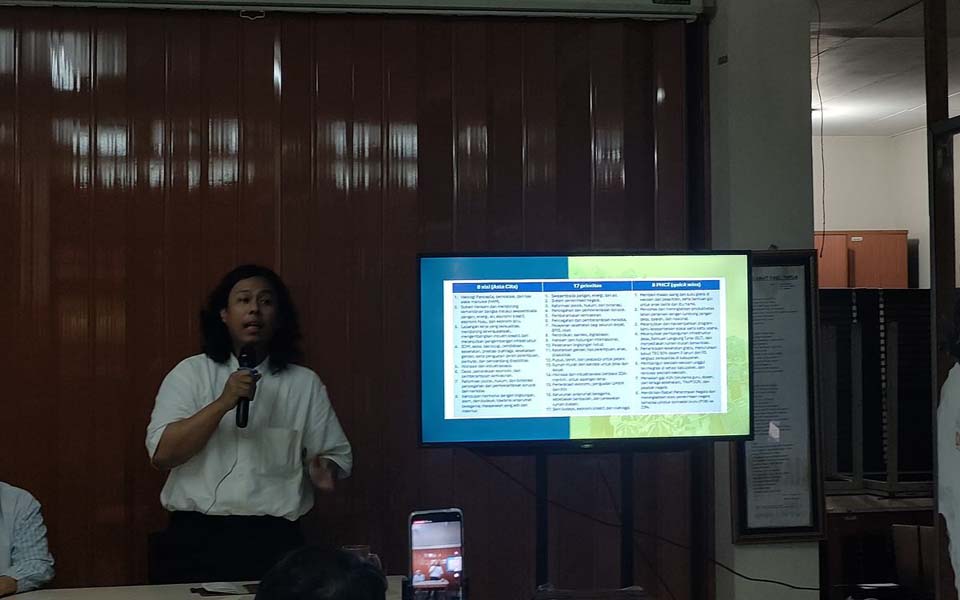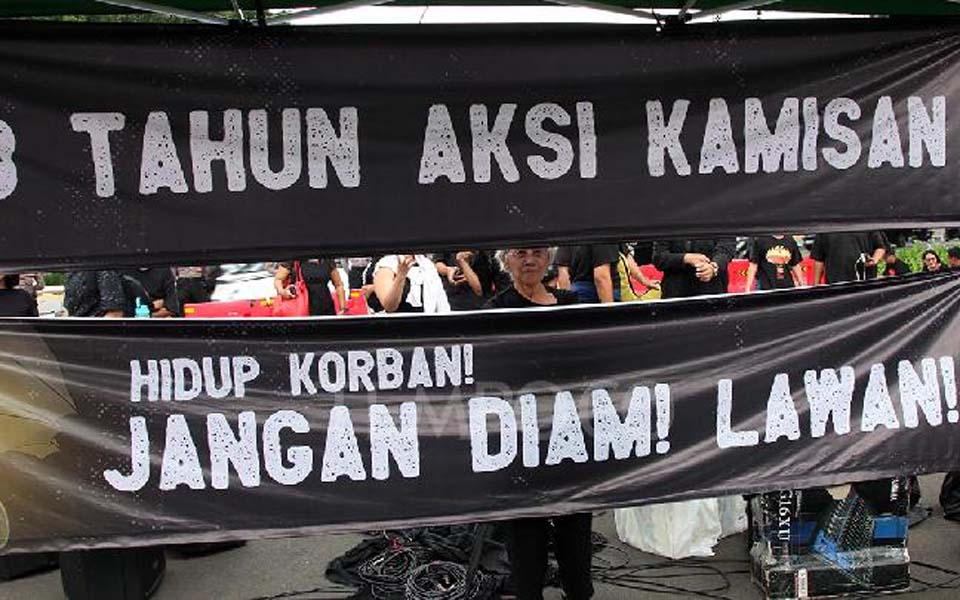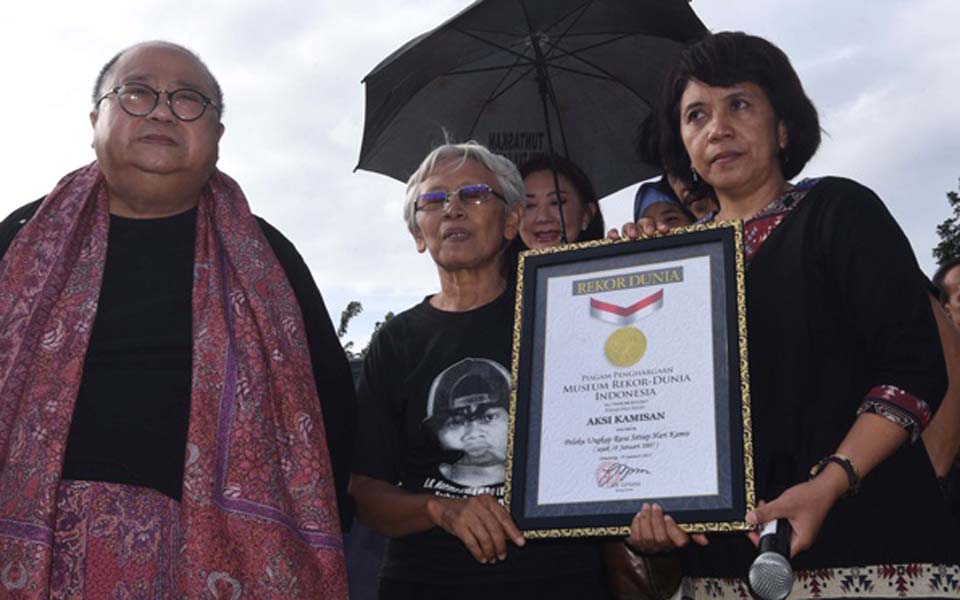Oppose the 2009 elections of the political elite – an election of the human rights violators, capitalists, corruptors and opportunist!
It has been 60 years since the International Declaration of Human Rights, and on every December 10, people throughout the world commemorate the event and demand that their governments fully address all human rights violations, without exception.
In Indonesia, the problem of human rights violations will never be resolved because it has its roots in three principle obstacles, that are still deeply implanted: the ruminants of the old forces (the Golkar party as a manifestation of Suharto’s New Order regime); the military (TNI) and the territorial commands1 and their controlling structures: (the Regional Military Commands (Kodam), Sub-Regional Military Command (Korem), the Sub-District Military Commands (Koramil) and Non-commissioned military officer posted in villages and wards (Babinsa); and the fake reformists who are cowards and will not stand up to the military.
Yet the ordinary Indonesian people and human rights activists have never taken a break from the struggle in the form of various demands, actions and legal mechanisms; continuing to demand that the government uphold justice for the ordinary people whose human rights have abused and for the perpetrators to be punished. By way of example, since 2007 the Solidarity Network for Victims and Families of Victims (JSKKK) has held no less then 88 actions every Thursday in front of the State Palace – pressure that has only so far recently succeeded in resolving the 2004 assassination of human rights activist Munir (with disenchantment over the results because they are felt to be unjust).
In legal terms, the results have been few and insignificant. According to 2006 data from the Commission for Missing Persons and Victims of Violence (Kontras), cases of gross human rights violations such as East Timor in 1999, Tanjung Priok2 1984 and Abepura3, the majority of perpetrators were released, some are in the process of appeal and the small number of perpetrators that were sentenced are now free, and even this has not been able to touch the brains, the generals behind these rights violations.
So far, the law has only reached the field operators – and even this has only been for specific cases that have obtained significant attention and political pressure. Such as the Alas Tlogo4 case and the Munir assassination – which has only succeeded in sentencing former Garuda pilot Polycarpus Budihari Priyanto and is now trying former State Intelligence Agency (BIN) deputy head Muchdi Purwopranjono.
The law has been incapable of catching the generals, incapable of bring to trial gross human rights violation cases that would have a significant political impact on the parentage of to in political power today. The law has been silent in the face of the slaughter of 3 million innocent people in 1965-66, the pre-referendum violence in East Timor (1974-1999), the “Petrus” mysterious shootings (1982-1985), the Kedungombo dam case, the Talangsari case (1989), the Marsinah case (1995), the July 26, 1996 case, the abduction and disappearance of activist (1997-1998), the Trisakti and Semanggi I & II cases, the Mai 1998 riots in Jakarta, and the military operations (DOM) in Aceh and West Papua, the Bulukumba case (2003), and have disregarded the criminals and government cronies responsible for the Lapindo Brantas mud disaster in East Java.
The late President Suharto, retired General Wiranto (former TNI commander in chief), former General Susilo Bambang Yudhoyono, retired Major General Sjafrie Sjamsoeddin (former Jakarta military commander), Police Inspector General Hamami Nata (former Metro Jaya regional police chief), Lieutenant General Djaja Suparman (former Jakarta military commander) and Noegroho Djajoesman (former Jakarta police chief), retired Lieutenant General Sutiyoso (former Jakarta military commander), retired Lieutenant General Prabowo Subianto, retired Major General Zacky Anwar Makarim (former head of the East Timor Referendum Task Force), retired Major General Kiki Syahnakrie (former East Timor martial law commander), retired Major General Adam Rachmat Damiri (former head of the Udayana military command), retired Major General A. M. Hendropriyono, are among the generals who are responsible for gross human rights violations that have been allowed to remain free to this day.
In order to be able to punish these people, the legal channels that currently exist cannot be counted upon any more. The political method of mobilising the ordinary people is the only and most effective means that has been demonstrated to be able to do this.
Don’t wait for the 2009 elections
Since the fall of former President Abdurrahman “Gus Dur” Wahid in 2001, there have been three forces that are currently and will continue to endeavour to remain in power: the revitalisation or restoration of the New Order in the manifestation of the Golkar Party; the fake reformist groups, particularly those who have become parasites (taking advantage of the people and activists that have struggled so hard) during the momentum of reformasi in 1998, such as the Justice and Prosperity Party (PKS), the National Mandate Party (PAN), the National Awakening Party (PKB), the Star Reform Party (PBR), the Crescent Star Party (PBB) and so forth and; the military. Gus Dur’s fall was a reflection on how the military supported these groups (groups 1 and 2) to overthrow Gus Dur.
The remnants of the New Order in the form of Golkar and the military are moving stealthily to seek avenues to reenter the civil political arena, in fact they became even more open in putting themselves forward after almost the entire spectrum of the elite political forces agreed with forgiving Suharto. Even the PKS, which is considered the “most reformist” is also ingratiating itself with Cendana5 circles.
Opportunities to plunder the civilian domain by the military have been strengthened by the involvement of those who have not been half-hearted and are increasingly strong within the political parties that will participate in the 2009 elections. The following are the names of the parties and the generals involved in them according to a report by the British based rights organisation TAPOL:
The People’s Conscience Party (Hanura Party) is headed by Wiranto, assisted by other former generals such as retired Lieutenant General Arie Mardjono and retired Rear Admiral Abu Hartono, retired Major General Aqlani Maza, retired Admiral Bernard Kent Sondakh, retired Rear Air Marshal Budhy Santoso, retired police General Chaeruddin Ismael, retired Lieutenant General Fachrul Razi, retired Lieutenant General Suaidi Marassabessy and retired General Soebagyo, who occupy posts as deputy chairpersons of the party’s advisory board and seven regional deputy chairpersons of the party. The deputy treasurer of the party meanwhile is retired Major General Iskandar Ali.
The Greater Indonesia Movement Party (Gerindra Party) is headed by Prabowo Subianto, assisted by retired Major General Muchdi Purwopranyoto – who is currently on trial for the premeditated murder of Munir, and retired intelligence officer Major General Gleny Kairupan who played a major role in case of human rights violations in East Timor, both of whom are deputy chairpersons of the party.
The Concern for the Nation Functional Party (PKPB) is headed by retired General R. Hartono, together with retired Major General Hartarto, retired Major General H. Namoeri Anoem, retired Brigadier General Suhana Bujana and retired Rear Air Marshal Suharto.
Other political parties that have accommodated retired military officers include the Nusantara Republican Party (PRN), the National Democratic Party (PDK), the Functional Party of Struggle (Pangan Party), the National Front Party (PBN), and of course the old party players such as the Golkar Party, the Indonesian Democratic Party of Struggle (PDI-P), the Democrat Party (PD), the Star Crescent Party (PBB) and so forth.
Retired generals such as former Jakarta Governor Sutiyoso, have also taken part in promoting the formation of small parties such as the Republican Party (PR), the National Nurturing Party (PBN), the Freedom Bull National Party (PNBK) and the National Integrationist Party (PPB). He has also succeeded in gaining influence in and support from a number of other parties such as the United Development Party (PPP) and the National Mandate Party (PAN).
Aside from this, the illusion that is currently being fostered is that the military can still be controlled by civilians (professionalism of the TNI) – for example with the departments of defense and security, this minister of which is a civilian. But this has never been demonstrated in the field, because the military is still unable to be controlled (the Alas Tlogo case, the military’s use of violence in many agrarian cases, labour relations, evictions and reactionary civil-militia groups are example of this control). The education on human rights given to the military is little more than a sweetener, because it will not be capable of reforming the character of the military institution itself – as a tool to protect capital and a tool to oppress the poor.
There has already been ample evidence for the Indonesian people (and it should also be enough for human rights defenders) that the elite administration does not have the will to defend the ordinary people. The spectrum of elite political forces that head the post-reformasi legislative, executive and judiciary, are simply fake reformists who have joined hands with the remnants of the old order and the military, who cannot be expected to have any interest in let alone have the guts to resolve past human rights cases. It is for this reason therefore, that they must be overthrown.
Consolidating a national movement against cooption and cooperation
The movements are actually aware, that the demands for reformasi can only be carried through if the remnants of the old forces, the military, along with the fake reformists – who are increasingly demonstrating their real character – are successfully defeated by people’s power (and because of this, the people must build their own political force). And human rights violations in Indonesia also include the violation of the basic social and cultural rights of the people. And none of the elite political forces in Indonesia at the moment can be expected to eradicate these human rights violations, because it is precisely they who are involved in the various cases of human rights violations: the accomplices of western capital who are currently plundering the Indonesian people, the corruptors who have become parasites on the Indonesian economy and the opportunists who are taking advantage of the situation.
In addition to this, specific groups and individuals who pretending to be nationalist, anti-foreign and pro national self-sufficiency, have actually become part of the spectrum of the elite political forces – the liars and human rights violators. Prabowo and Wiranto, who support a fake kind of nationalism, are actually spreading the seeds of fascism and manipulating the people’s poverty and the lack of an alternative political leadership. It was these kinds of sentiments that were used by Hitler when Germany suffered defeat (in its wars) and the people were struck down with severe poverty. How can prosperity possibly exist under the barrel of a gun? How can democracy possibly exist if the country’s leaders are big time human rights criminals.
This is also the case with the fake nationalists such as former Consultative Assembly Speaker Amin Rais, former economic minister Rizal Ramli, former finance minister Kwik Kian Gie and former President Megawati Sukarnoputri, whose track records show that they have never truly struggled for a people’s economy and for improvements to national productivity and economic self-sufficiency, which is natural because they do not have the political capacity – or the courage to become involved in people’s power or in their struggle – and the cognitive (read cleverness) to be independent from the domination of foreign capital, or not move slowly, be subject to domestic capital domination – the westerners with black skin.
It is because of this therefore, that there is no other path, no easy road. The Indonesian people and the movements – which are aware that now is the time to building an independent people’s power movement – must immediately unite. Unit to build an alternative political vehicle, in a concrete form with the task of spreading and uniting the mobilisations of the various expressions of the people’s resistance. This expression of the people’s resistance cannot be allowed to be compromised by, and swallowed by the enemies of the people – the forces of the imperialist government agents, the military, the remnants of the New Order regime and the fake reformists.
Thus, the current tasks of the movement are to:
1. Force the colonialist agents in government and the political elite to resolve cases of human rights violations;
2. Oppose all polices of the colonialist agents in government and the political elite including:
- Costly education, housing and healthcare
- The evictions and arrest of the poor
- The joint ministerial decree (limiting wage rises to economic growth), cheap wages, price increases, privatisation and the lack of fertilizer
- The foreign debt and loans to bail out the capitalists
3. Oppose the 2009 elite political elections – the election of human rights violators, capitalists, corruptors and opportunists;
4. Build an alternative united political vehicle that is independent and on a nation wide scale;
5. Replace the colonialist agents in government and the political elite in order to form a United Government of the Poor, with the principle tasks of: (a) concentrating all state funding to resolve the emergency needs of the people and build a national industrialisation program under the people’s control and (b) investigate all past human rights crimes committed in Indonesia and strive to bring the perpetrators of these rights violations before the courts (either an international court or a domestic human rights court), and if necessary, to try them in absentia.
Jakarta, 10 December 2008
Union for the Politics of the Poor National Executive Committee (DHN-PPRM)
Jl. Manggarai Utara I Blok H No6-A
Kel. Manggarai, Kec. Tebet
Jakarta Selatan
Tel/Fax: 0218297332
Email: persatuan.politik.rakyat.miskin@gmail.com
Notes:
1. The TNI’s territorial command structure mandates the deployment of military command posts and detachments at all levels of the civil administration: provincial, district, sub-district and village. This structure provides the organisational framework for the TNI to act as a political security force at all levels of society. The five respective commands are: Kodam – Komando Daerah Militer, Regional Military Command; Korem – Komando Resort Militer, Military Command at a level below the residency; Kodim – Komando Distrik Militer, District Military Command; Koramil – Komando Rayon Militer, Sub-District Military Command (Kecamatan) level and; Babinsa – Bintara Pembina Desa, a non-commissioned military officer posted in villages and wards and affiliated with the civilian administration.
2. On 12 September 1984, dozens of people were killed and injured when troops fired on Muslim demonstrators in the port district of Tanjung Priok, North Jakarta.
3. On December 7 2000, some 30 residents attacked and set fire to the local police station in Abepura near the Papuan capital of Jayapura. A police officer was killed and three others wounded in the incident. About an hour later police assisted by the notorious Mobile Brigade began a search for the perpetrators scouring nearby residential areas and hostels, including a student residence. During the search, police allegedly arrested, assaulted and tortured at least 99 people resulting in three deaths.
4. The May 30 shooting spree in Alas Tlogo village, Pasuruan, left four people dead and eight wounded. The clash occurred after a dispute between villagers and Navy officials over a plot of land.
5. Cendana – the late President Suharto’s Central Jakarta neighborhood, the relatives and cronies of the Suharto clan.
[Translated by James Balowski.]






